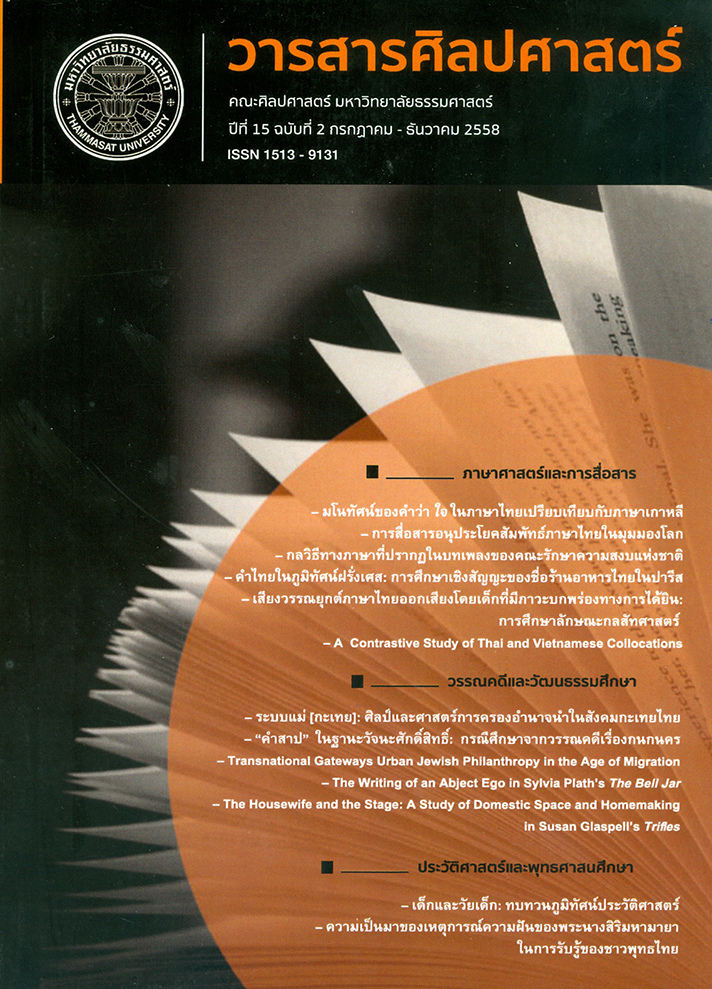“คำสาป” ในฐานะวัจนะศักดิ์สิทธิ์: กรณีศึกษาจากวรรณคดีเรื่องกนกนคร
Main Article Content
บทคัดย่อ
บทความนี้มีวัตถุประสงค์เพื่อวิเคราะห์องค์ประกอบของคำสาปในประเด็นต่าง ๆ ที่ปรากฏในวรรณคดีไทยได้แก่ ตัวผู้สาป ผู้ถูกสาป เหตุปัจจัยแห่งการสาปและการถูกสาป เนื้อหาของคำสาป ผลของคำสาป ตลอดจนวิธีการหรือเงื่อนไขที่นำไปสู่หนทางแห่งการหลุดพ้นจากคำสาป ข้อมูลที่ใช้ในการศึกษาวิเคราะห์ได้แก่วรรณคดีไทยเรื่อง“กนกนคร” ผลการศึกษาพบว่า คำสาปเป็นเครื่องมือของผู้มีฤทธิ์อำนาจ สำหรับใช้ในการลงโทษผู้ที่ประพฤติตนผิดศีลธรรม จรรยา จารีตและขนบธรรมเนียมของสังคม คำสาปที่ปรากฏในวรรณคดีไทยเป็น “วัจนะศักดิ์สิทธิ์” คือถ้อยคำที่มีอำนาจ สามารถมีอิทธิพลหรือส่งผลในทางร้ายประการใดประการหนึ่งต่อวิถีชีวิตของตัวละครในวรรณคดี ทำให้ตัวละครที่ต้องคำสาปมีอันเป็นไปตามถ้อยความแห่งคำสาปนั้น คำสาปมีอิทธิพลต่อโครงเรื่อง ทำให้เรื่องน่าติดตาม คำสาปสามารถเป็นได้ทั้งต้นกำเนิดและจุดจบของเรื่อง พร้อม ๆ กับเป็นบ่อเกิด ความเป็นมา และจุดจบตัวละครในวรรณคดีได้เช่นเดียวกัน
คำสำคัญ คำสาป วัจนะศักดิ์สิทธิ์ กนกนคร วรรณคดีไทย
The aim of this study was to analyze the composition of curses in various dimensions that appeared in Thai literature including cursers, curses, factors in cursing and being cursed, the content of cursing words, the consequence of cursing, and methods or conditions for salvation from the curse. Data for this study was taken from "Kanoknakhon". The results showed that curses were a discursive tool for people holding "authoritative power" to prevent, suppress, and punish those who behaved against social morality, ethics, ritual, and norms. The curse words appeared in Thai literature served as “holy expressions” or “literature of power” that could bring harm to lives of characters in the literature. The characters being cursed would therefore receive misfortune as a consequence. Curses played an influential role in plotting the storyline as the origin and the end of the story, as well as the start and the end of characters in the literature.
Keywords: Curse Words, Holy Words, Kanoknakhon, Thai literature


